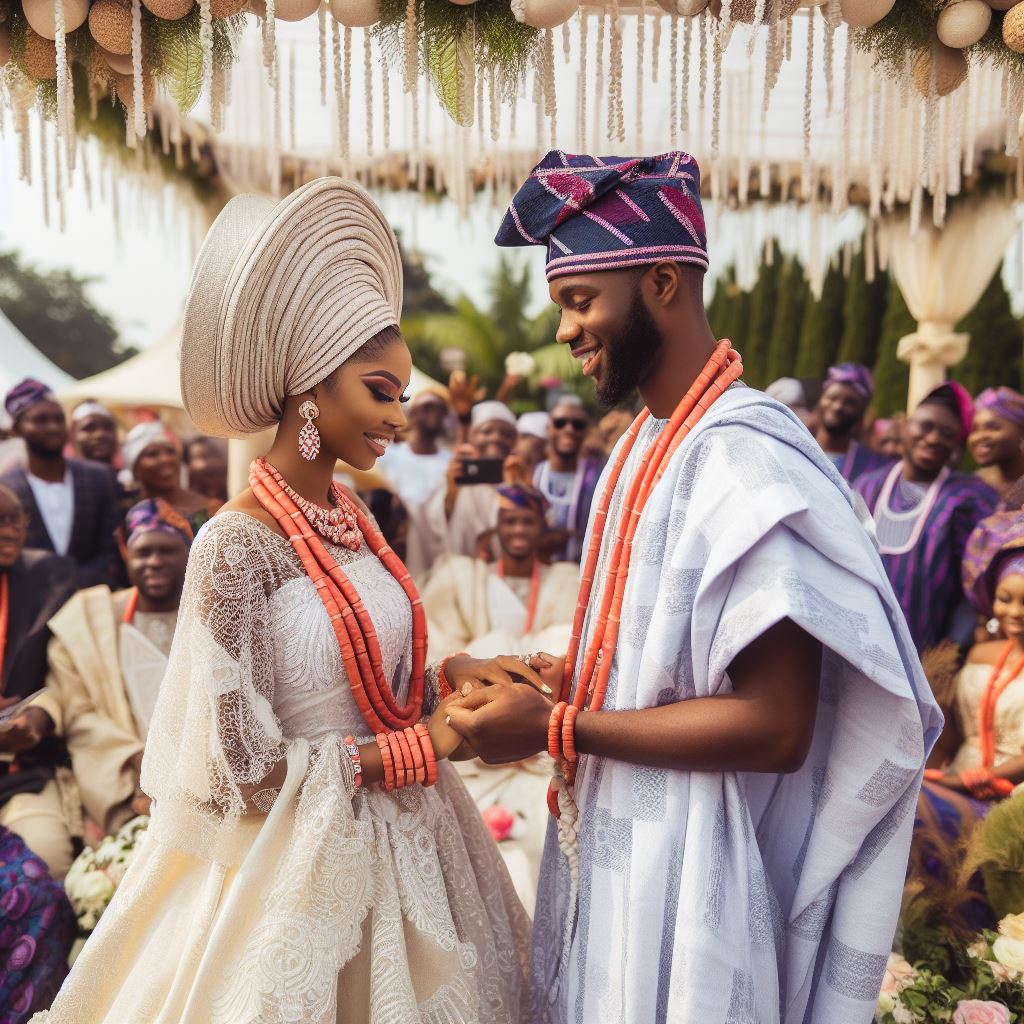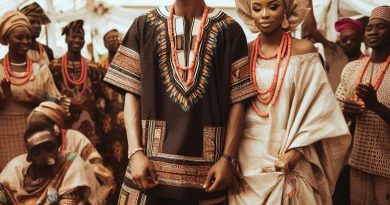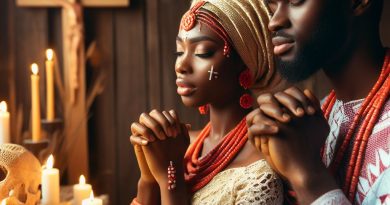How Religion Affects ‘Marriage by Ordinance’ Choices in Nigeria
Last Updated on January 28, 2024
Introduction
Brief Explanation of the Topic
How Religion Affects Marriage by Ordinance Choices: Religion exerts significant influence in Nigeria, extending its reach into the institution of marriage.
In this diverse nation, where multiple faiths coexist, marriage customs and practices are significantly impacted by religious beliefs.
Overview of Marriage in Nigeria
Marriage is a fundamental aspect of Nigerian culture, a sacred union between two individuals, their families, and communities.
It comes in various forms: the traditional, civil, and religious unions, with each holding its own unique significance.
Religion permeates every aspect of life in Nigeria, and it plays an undeniable role in shaping the choices people make regarding marriage.
Religious ordinances offer a set of guidelines for marriage, including rituals, vows, and moral principles.
With over 250 ethnic groups and countless religions, the marriage landscape in Nigeria is complex, diverse, and rich in tradition.
In the following sections, we’ll explore how different faiths, from Islam to Christianity to indigenous belief systems, influence the ‘marriage by ordinance’ choices of Nigerians.
This intricate interplay between religion and marriage reveals a dynamic tapestry of customs, beliefs, and traditions that make Nigeria’s matrimonial landscape a captivating subject of study.
Overview of Marriage by Ordinance in Nigeria
Explanation of the Marriage Act
The Marriage Act is the legal framework that governs marriage by ordinance in Nigeria.
It was enacted in 1914 during the colonial era and has undergone several amendments since then.
The Act provides guidelines and regulations for conducting marriage ceremonies under the church or registry.
It applies to all Christian denominations and any other religious group that chooses to register under the Act.
Provisions and requirements for marriage under the Marriage Act
To have a marriage recognized under the Marriage Act, certain provisions and requirements must be fulfilled.
- Both parties must be at least 21 years old, or in the case of minors, have consent from their parents or guardians.
- There must be a notice of intention to marry given at the registry or church at least 21 days prior to the wedding ceremony.
- The parties must provide necessary documents such as birth certificates, identification cards, and proof of divorce (if applicable).
- There must be two witnesses present at the ceremony who are of sound mind and can attest to the union.
- The marriage ceremony must be conducted by a recognized clergyman or registrar appointed by the government.
Recognition and legality of marriages conducted under the Marriage Act
Marriages conducted under the Marriage Act are recognized and legally binding in Nigeria.
Such marriages have legal rights and privileges, including inheritance and property ownership.
They are also eligible for divorce under the Matrimonial Causes Act if the marriage breaks down irretrievably.
In addition, children born within such marriages are considered legitimate and have inheritance rights.
Any marriage conducted outside the provisions of the Act may be considered null and void in the eyes of the law.
It is important for couples to ensure compliance with the Marriage Act to protect their legal rights and the validity of their union.
Basically, marriage by ordinance in Nigeria, specifically under the Marriage Act, is a well-defined legal process.
It provides couples with a recognized and legally binding union, protecting their rights and interests.
By understanding and adhering to the provisions and requirements, couples can have a successful marriage and enjoy the benefits and privileges associated with it.
Read: Understanding ‘Marriage by Ordinance’ in Nigeria: A Primer
Influence of Religion on Marriage by Ordinance Choices
Importance of religious beliefs and practices in Nigeria
Religion plays a significant role in the lives of Nigerians, shaping their beliefs and practices.
- Nigerians are known for their strong religious affiliations, with Christianity and Islam being the two main religions.
- Religious beliefs are deeply ingrained in their culture and influence various aspects of their lives, including marriage.
- Religious practices are seen as a way to connect with a higher power and seek guidance for important life decisions.
Role of religion in shaping individuals’ views on marriage
Religion has a profound influence on how individuals perceive and approach marriage in Nigeria.
- Religious teachings emphasize the sanctity and lifelong commitment of marriage.
- They promote values like fidelity, faithfulness, and mutual respect within a marital relationship.
- Religious scriptures and sermons often provide guidance on selecting a suitable partner and maintaining a harmonious marriage.
Influence of religious institutions on marriage choices
Religious institutions play a crucial role in the decision-making process when it comes to marriage in Nigeria.
- They provide a framework for conducting marriage ceremonies based on religious ordinances.
- Marriage counseling and premarital classes are offered by religious institutions to prepare couples for a successful marriage.
- Religious leaders are often consulted for advice and blessings before entering into a marriage.
Generally, religion holds a significant influence on marriage by ordinance choices in Nigeria.
Religious beliefs and practices shape individuals’ perspectives on marriage, emphasizing its sanctity and lifelong commitment.
Religious institutions provide guidance, support, and rituals associated with marriage, helping couples navigate this important life decision.
Read: Marriage by Ordinance vs. Traditional Marriage: What’s Different?
Christianity and Marriage by Ordinance
Overview of Christianity in Nigeria
- Christianity is the dominant religion in Nigeria, with about 51% of the population identifying as Christians.
- The major denominations in Nigeria include Catholicism, Protestantism, and Pentecostalism.
- Christianity has a significant influence on various aspects of Nigerian society, including marriage.
Christian beliefs and values regarding marriage by ordinance
- Christians believe that marriage is a sacred institution ordained by God.
- They view marriage as a lifelong commitment between a man and a woman.
- Christians consider the Bible as the ultimate authority on marriage and adhere to its teachings.
- They believe that marriage is a symbol of Christ’s love and union with the Church.
- Christians are encouraged to marry fellow believers and share the same faith.
Impact of Christian teachings on marriage choices in Nigeria
- Christians in Nigeria often seek guidance from religious leaders when making marriage decisions.
- They prioritize finding a partner who shares their Christian faith and values.
- Christian teachings emphasize fidelity, loyalty, and commitment in marriage.
- Divorce is generally discouraged but can be allowed in cases of adultery or abuse.
- Christians value the sanctity of marriage and strive to maintain healthy and loving relationships.
Benefits of marriage by ordinance in Christianity
- Christians believe that marriage provides a stable and nurturing environment for raising children.
- Marriage by ordinance is seen as a way to honor God and fulfill His plan for marriage.
- It strengthens the bond between couples through shared spiritual values and beliefs.
- Marriage by ordinance encourages couples to seek spiritual guidance during challenges and conflicts.
- It promotes the growth and development of individuals as they strive to become better partners.
Challenges faced in marriage by ordinance in Christianity
- The pressure to conform to societal and cultural expectations can strain marital relationships.
- Religious differences can create conflicts and challenges for couples from different faith backgrounds.
- Lack of proper understanding and interpretation of Christian teachings on marriage can lead to misunderstandings.
- External influences, such as economic hardships and societal changes, can impact the stability of marriages.
- The strict adherence to Christian teachings on marriage can sometimes limit individual freedom and happiness.
In general, Christianity has a significant impact on marriage choices in Nigeria.
Christian beliefs and values guide individuals in finding a partner who shares the same faith.
The teachings of Christianity emphasize the sanctity of marriage, commitment, and fidelity.
Marriage by ordinance is seen as a way to honor God and provide a nurturing environment for raising children.
However, challenges such as societal pressures, religious differences, and misunderstandings can arise.
Despite these challenges, Christianity continues to shape the institution of marriage in Nigeria, promoting strong, loving, and lasting unions.
Read: Advantages and Disadvantages of Marriage by Ordinance in Nigeria

Islam and Marriage by Ordinance
Overview of Islam in Nigeria
- Islam is the dominant religion in Nigeria, with approximately 50% of the population being Muslims.
- The religion was introduced to the region in the 9th century through trade and influence from the North African Arab states.
- Islamic practices and beliefs have since become deeply integrated into Nigerian society.
Islamic principles and teachings on marriage by ordinance
- Islam considers marriage to be a sacred bond between a man and a woman.
- The primary purpose of marriage in Islam is to establish a family unit and fulfill religious obligations.
- Islamic teachings emphasize the importance of mutual respect, love, and support between spouses.
- Polygamy is permitted within Islamic law, with certain conditions and limitations.
- A Muslim man is allowed to have up to four wives, but he must treat all of them equally.
Role of Sharia law in Muslim marriage choices
- Sharia law, derived from the Quran and the Hadith, governs many aspects of Muslim life, including marriage.
- In Nigeria, Sharia law is implemented in several northern states, where majority populations are Muslims.
- Under Sharia law, Muslim couples have the option to choose marriage by ordinance.
- Marriage by ordinance allows couples to bypass civil marriage and instead opt for a religious ceremony.
- Many Muslim couples choose marriage by ordinance, believing it aligns with Islamic principles for proper recognition.
In Nigeria, Islam plays a significant role in shaping marriage choices by ordinance.
The religion’s prevalence in the country, along with its principles and teachings, provide a strong foundation for Muslim couples to choose this path.
Sharia law further enables and supports marriage by ordinance, giving couples the opportunity to have a marriage recognized under Islamic law.
By understanding the role of Islam in marriage choices, we can appreciate the diversity and complexity of marital practices in Nigeria.
Read: Top Venues for ‘Marriage by Ordinance’ Ceremonies in Nigeria
Traditional African Religions and Marriage by Ordinance
Introduction to traditional African religions in Nigeria
- Traditional African religions form a significant part of Nigeria’s cultural and religious landscape.
- These religions are deeply rooted in the indigenous beliefs and practices of different ethnic groups.
- Nigeria is home to a diverse range of traditional African religions, including Yoruba, Igbo, and Hausa-Fulani.
- These religions often influence the social, economic, and political aspects of Nigerian society.
Traditional beliefs and customs related to marriage by ordinance
- Marriage by ordinance refers to the formal recognition of marriage under traditional African religions.
- In traditional African religions, marriage is seen as a sacred bond between a man and a woman.
- Marriages are often arranged by families, and the consent of both parties is essential.
- Traditional African religions emphasize the importance of procreation within marriage to ensure the continuity of the community.
- The celebration of marriage involves elaborate rituals, ceremonies, and symbolic exchanges.
Continuation of traditional practices in modern Nigerian society
Despite the influences of Westernization and Christianity, traditional African religions still have a significant impact on marriage choices in Nigeria.
Many Nigerians incorporate traditional customs and beliefs into their wedding ceremonies, even if they have converted to another religion.
Traditional African religions provide a sense of cultural identity and heritage for Nigerians.
They also offer an alternative option for those who may not resonate with Western or Christian wedding traditions.
Interestingly, some Nigerian couples choose to have both a traditional African wedding and a Western-style wedding, combining the best of both worlds.
Traditional African religions promote community involvement and support in marriages, fostering a sense of unity and collective responsibility.
The belief in ancestral spirits and deities also plays a role in marriage decisions, as individuals seek their blessings and guidance.
Traditional practices such as paying bride price and performing traditional rites before marriage still hold significance in Nigerian society.
Despite the influence of modernity, tradition remains deeply ingrained in the fabric of Nigerian culture.
Delve into the Subject: Modern vs. Traditional: Changing Views on Marriage
Interfaith Marriages and Marriage by Ordinance
Challenges faced by couples from different religious backgrounds
Interfaith marriages in Nigeria often encounter numerous challenges due to the diverse religious backgrounds of the couples.
- These challenges include clashing religious beliefs, traditions, and cultural practices.
- Couples may face difficulties in finding a common ground that accommodates both partners’ faiths.
- Family and societal pressures can also contribute to the challenges faced by interfaith couples.
- The disapproval and resistance from families and communities can put a strain on the relationship.
Approaches to navigating interfaith marriages in Nigeria
A successful interfaith marriage requires open communication, mutual respect, and compromise.
Couples can explore different approaches such as practicing both faiths individually, finding a common spiritual path, or choosing one religion to follow together.
Seeking guidance from religious leaders who are open-minded and understanding can also be helpful.
Building a strong support system with like-minded interfaith couples can provide emotional support and helpful insights.
Education and understanding about each other’s religions can bridge the gap and promote acceptance.
Impact of religion on the decision to marry by ordinance
Religion plays a significant role in the decision of Nigerian couples to marry by ordinance.
The constitution of Nigeria recognizes both civil and customary marriages.
However, couples may choose to marry by ordinance due to religious reasons, especially when one partner belongs to a religious group that does not recognize customary marriages.
The belief that religiously-sanctioned marriages are more spiritually binding and secure can influence the decision to opt for marriage by ordinance.
Additionally, some couples may marry by ordinance to avoid potential conflicts arising from interfaith unions.
Conclusion
Religion plays a significant role in shaping Nigerians’ decisions regarding marriage by ordinance.
The study has shown that religious beliefs and practices heavily influence the choice to have a religious or civil marriage.
This influence is particularly evident in the dominant religions of Nigeria – Islam and Christianity.
Muslims widely prefer the Islamic Nikah marriage ordinance, driven by their strong adherence to Quranic guidelines.
Nigerian Christians also favor religious marriage ceremonies for doctrinal significance.
The sacramental nature of marriage in Christianity and the belief in seeking the blessings of God through a religious ceremony make it the preferred choice for many Christians.
Final thoughts on the significance of religion in Nigerian marriages
Religion holds immense significance in Nigerian marriages, acting as a guiding force that shapes the choices and decisions made by couples.
It goes beyond mere rituals and ceremonies; religion forms the foundation of their marital commitment, providing ethical and moral guidelines that govern their actions within the marriage.
Furthermore, the influence of religion extends to societal norms and values, creating a sense of community and cultural identity within the context of marriage.
It fosters a shared belief system, reinforcing the notion of marriage as a sacred institution that strengthens the bond between individuals and their respective faith communities.
In a nutshell, the impact of religion on marriage by ordinance choices in Nigeria cannot be underestimated.
It profoundly shapes the lives and choices of couples, connecting them to a larger religious and cultural framework that defines their sense of self, family, and community.


